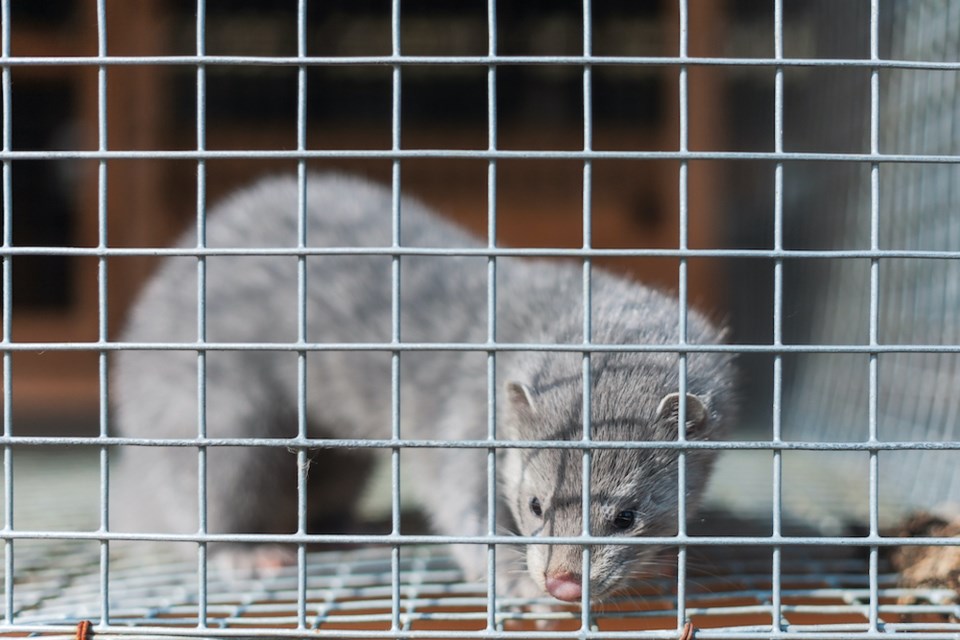Three mink that died on a second Fraser Valley mink farm have tested positive for SARS-CoV-2, the virus that causes COVID-19 in humans.
The chief veterinarian for B.C. has placed the farm under a quarantine order prohibiting the movement of animals and materials from the property to minimize the risk of the virus spreading, the B.C. Ministry of Agriculture, Food and Fisheries announced Thursday (Dec. 24) in a statement.
A plan is in place to care for the mink during the outbreak that will respect the conditions of the quarantine and maintain worker and mink safety.
So far, no workers on the farm have tested positive for COVID-19.
"The three mink were tested after some animals in the herd experienced diarrhea, which can be a sign of COVID-19 in mink. Twenty-three animals died on the farm between Dec. 19-23. The farm has approximately 1,000 animals. It is not currently known how the mink contracted the virus and the ministry is currently working with stakeholders to identify potential sources," read the statement.
All mink farms in B.C. are contributing to an enhanced surveillance and testing program to monitor for COVID-19. The farms were inspected by ministry staff as part of a routine process in summer 2020 to ensure they were in compliance with all animal welfare and biosecurity standards, which offer the best preventative measures against disease.
Eight people test positive for COVID-19 at B.C. mink farm
Earlier this month, the Fraser Health Authority stated that eight people at a different mink farm in the Fraser Valley tested positive for COVID-19.
Following this, the BCAFF reports that about one per cent, or roughly 200 mink, were reported to have died between Dec. 4-9 following the outbreak.
The majority of the mink on the first farm do not appear to have been showing symptoms since then, and there have been no further unusual mortalities reported. Genetic analysis of SARS-CoV-2, the virus that causes COVID-19, has been completed in both animals and people associated with the first farm.
"The results show the people and animals were infected with an identical or nearly identical strain. The strain detected has been circulating in people in B.C., indicating COVID-19 spread from people to animals and not the other way around," explains the BCAFF.
The locations of both farms are not being released as per Section 16.1 of the Animal Health Act, which prohibits the disclosure of information that would identify a specific place where an animal is located.
Animal rights group launches petition following COVID-19 outbreak on B.C. mink farm
Animal rights groups are raising concerns about the ethical and environmental ramifications of fur farming in Canada following the outbreaks.
Lesley Fox, Executive Director of The Fur-Bearers--a charitable organization that works to end the commercial fur trade--tells Vancouver Is Awesome in a phone interview that this type of outbreak isn't unexpected given the conditions on fur farms.
Fox says fur farms are "problematic for animals, the environment, and human health," regardless of the type of animals being farmed.
"On one farm you have tens of thousands of individuals--and the keyword is individuals. And so, when you have one of those individuals that's sick, the capacity to spread that virus is certainly a domino effect," explains Fox.
Fox adds that all of B.C.'s farms are located within the Fraser Valley, which is part of the problem. If one individual escapes, they may spread a virus to nearby farms or animals.
“Thousands of mink are kept in small wire cages next to each other on these farms. Under these conditions, outbreaks of COVID-19 can spread like wildfire and acquire new mutations that may change the severity of disease, treatment or susceptible host,” Dr. Jan Hajek, an infectious diseases doctor at Vancouver General Hospital said in a statement.
“A parallel epidemic or reservoir of the virus could be established in animals that could then spread back to humans at a later date and impair our own response to this pandemic. Infection control interventions like face masks for workers, and laboratory surveillance to catch outbreaks early can help reduce, but will not eliminate these risks.”


